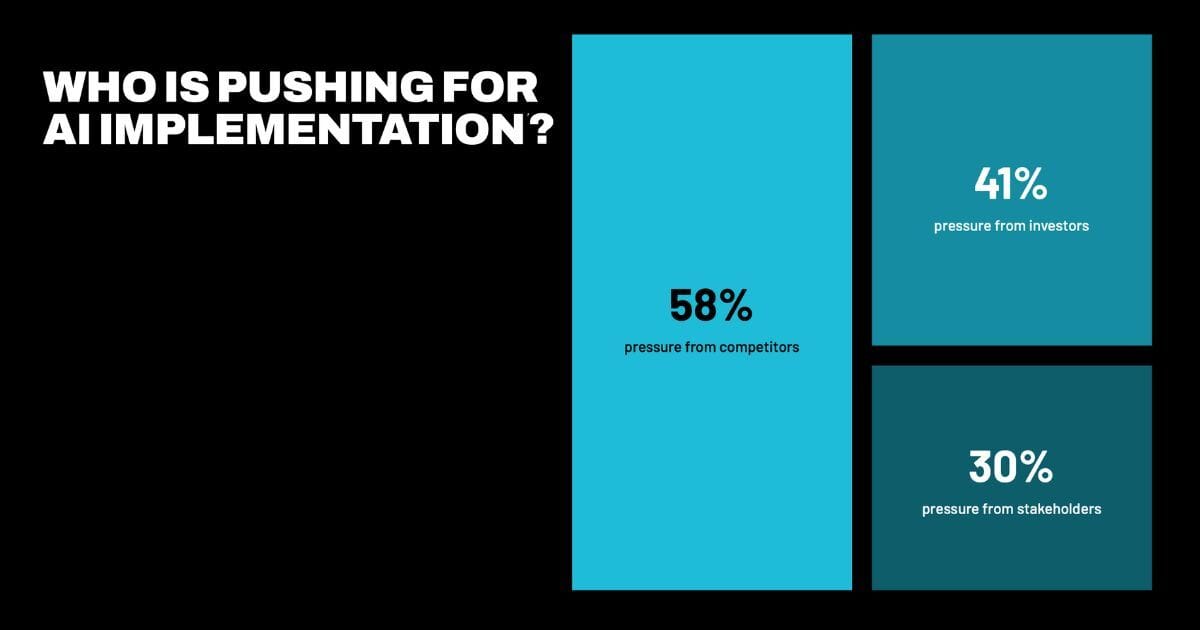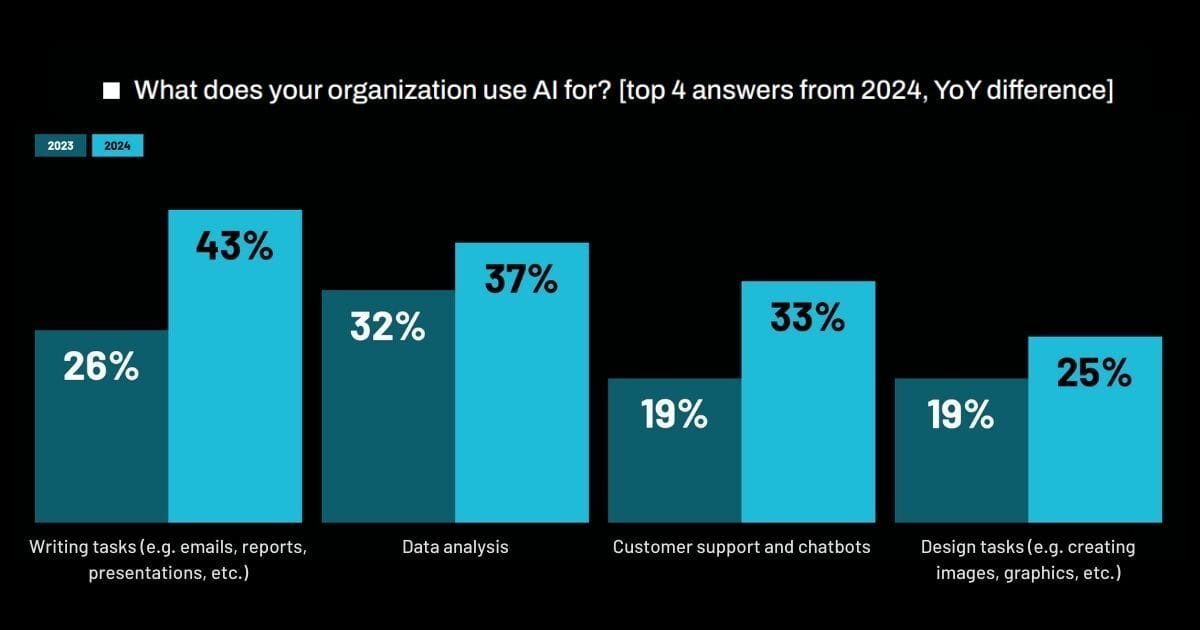"Artificial intelligence and generative AI may be the most important technology of any lifetime."
—Marc Benioff, Chair & CEO of Salesforce
The AI Breakdown
AI in the Workplace: Who’s Pushing, What’s Working, and Why It Matters
A 2025 Workplace AI Report from Teco.co just dropped, and the numbers are hard to ignore.
85% of businesses are now using AI in some capacity, a major jump from 66% last year.
The biggest driver? Competitive pressure. Companies aren’t just adopting AI because they want to—they’re doing it because their rivals already have.

Tech.co
Who’s Driving AI Adoption—and Why?
The push for AI isn’t coming from the IT department alone. According to the report, business leaders and executives are leading the charge, with 78% of C-suite decision-makers citing AI as a top priority. Their reasoning? Competitive survival.
But it’s not just leadership pushing AI adoption—employees are on board too. The report found that 67% of workers say AI tools make their jobs easier, freeing them from repetitive tasks like data entry and scheduling. In dealerships, that translates to sales teams spending less time on admin work and more time closing deals.
How Businesses Are Using AI
So where is AI making the biggest impact? The report highlights several key areas where companies are leveraging AI to improve operations:
Operations (27%) – AI is streamlining internal processes, reducing inefficiencies, and cutting costs.
Sales (15%) – Businesses are using AI-powered insights to refine customer targeting, personalize outreach, and improve lead conversion.
Product Development (14%) – AI is helping companies design, test, and refine products faster than ever before.
Beyond these core functions, organizations are also deploying AI in HR for recruitment and employee engagement, in cybersecurity for threat detection, and in finance for fraud prevention and risk assessment.
AI’s Real Business Impact
88% of leaders report that AI has improved productivity in measurable ways. In automotive retail, this translates to:
Faster decision-making – AI helps dealerships analyze data in real time, from market trends to customer buying behaviors.
Improved customer experience – AI-driven insights can help personalize interactions, reducing friction in the buying process.
Higher profitability – By reducing inefficiencies and automating repetitive tasks, AI frees up teams to focus on higher-value activities like customer service and sales.
With AI cementing itself as a workplace staple, the question for businesses is no longer if they should adopt AI—it’s how fast they can implement it effectively.
Top Tools
Honor’s AI Assistant Wants to Book Your Dinner—But Can It Deliver?
Honor is throwing its hat into the AI assistant ring with Honor UI Agent, a new AI-powered tool designed to navigate apps and complete tasks directly on your phone.
Instead of relying on APIs or cloud-based processing, this on-device AI agent visually understands what’s on your screen and takes action without you lifting a finger.
What It Can Do
At its core, Honor UI Agent is meant to simplify everyday tasks by mimicking how a human interacts with a smartphone’s interface. It uses Google’s Gemini 2 AI model for intent recognition and Qualcomm-powered on-device processing to keep data private.
🔹 Screen Understanding – The AI can interpret the elements of an app’s interface, allowing it to select options, enter details, and follow through with multi-step tasks.
🔹 Task Automation – Users can ask it to complete certain actions, like booking a table, ordering food, or navigating settings within an app.
🔹 Personalized Preferences – Over time, it learns user habits (like favorite cuisines) and makes choices based on past interactions.
The Limitations
For all its promise, Honor UI Agent isn’t quite seamless yet. The latest demo revealed several weak spots that may frustrate users.
🔸 Incomplete Tasks – The AI couldn’t complete a restaurant reservation that required a credit card entry, forcing the user to step in.
🔸 Limited Research – It selects options based on basic criteria (e.g., "highly rated"), but it doesn’t cross-reference reviews across platforms or pull in deeper insights.
🔸 No Cloud Access – While keeping data on-device improves privacy, it also means the AI’s knowledge is limited to what’s stored locally.
How It Stacks Up
Honor’s approach is less about AI-powered conversation and more about action, making it distinct from voice assistants like Siri or Google Assistant. Instead of using an API to complete tasks in the background, it visually processes the screen to execute commands directly—more akin to the Rabbit R1’s Teach Mode than traditional digital assistants.
However, this app-based automation is still in its infancy. For now, it needs some refinement before it becomes a true game-changer.
Prompt of the Week
What if your follow-up wasn’t just another “thanks for your business” email, but a reason to hit the road?
This week, let’s turn AI into your personal concierge. Instead of generic check-ins, send customers a handpicked list of local experiences—tailored to their new ride.
Generate a list of 10 local events, scenic drives, or hidden gems within a [50-mile] radius of [your city]. Include a mix of weekend getaways, food destinations, outdoor adventures, and family-friendly spots. Then, craft follow-up messages that connect these recommendations to the customer’s new car features. Highlight benefits like navigation for road trips, cargo space for weekend escapes, or premium sound for the ultimate driving playlist. Keep each message warm, engaging, and genuinely helpful.
Example Follow-Ups:
🚗 Got an SUV? “Your new ride was made for adventure. Check out this hidden state park just an hour away—plenty of room for gear and an excuse to try out that AWD.”
🎶 Premium sound system? “Your first road trip deserves a perfect playlist. This scenic drive pairs well with [local radio station] or [your favorite Spotify mix].”
🗺️ Advanced GPS? “No wrong turns here. This weekend getaway spot is off the beaten path—but your new navigation system makes getting lost impossible.”
Hear from the Experts
The Artificial Intelligence Revolution in Automotive Retail and a Glimpse into What the Next Decade Might Holds
The next decade will bring more change than the last century.
Over the next few years, dealerships will evolve from data-rich, insight-poor businesses into predictive, hyper-personalized retail powerhouses with the help of AI.
In the next three years, it will streamline operations—consolidating data, predicting customer behavior, and automating routine interactions. By 2030, seamless customer journeys, dynamic pricing, and AI-powered service recommendations will redefine the buying experience. Virtual showrooms and real-time personalization will become the norm, changing how customers interact with dealerships.
Looking even further ahead, AI will push the industry into uncharted territory. Autonomous sales models, self-sustaining dealership ecosystems, and predictive intelligence will shape a new era of efficiency and profitability.
Read the latest article here by Todd Smith of QoreAI to explore what’s in store. And, how to prepare.
Bits and Bytes
The Oscars considers requiring films to disclose AI use after best picture contenders utilize the tech. 🏆
According to a new study, 30% of parents say their kids use AI for learning. 👧
To compete with OpenAi and Google, Meta is planning to release a stand-alone app for its AI chatbot later this year. 🤖
Perplexity and T-Mobile are teaming up to launch a new AI phone priced at under a grand. ☎️





